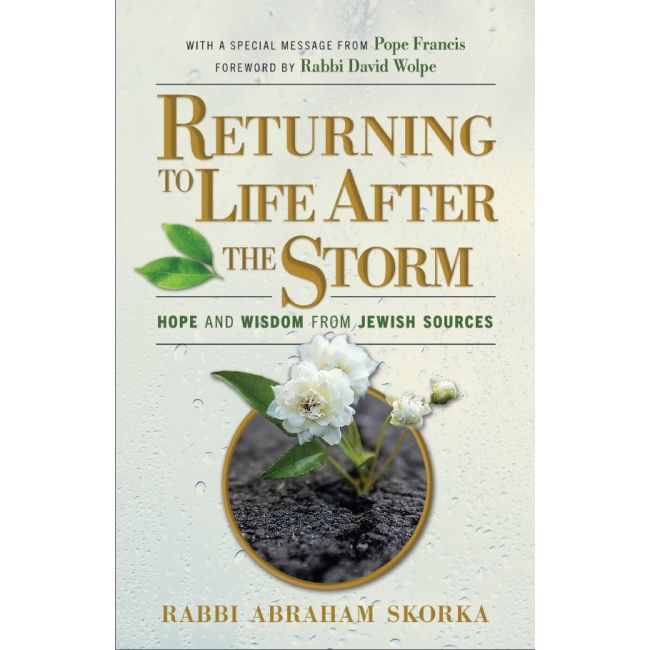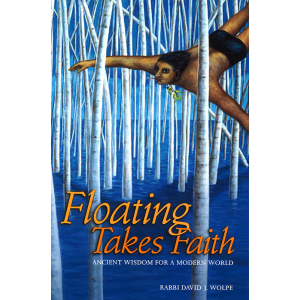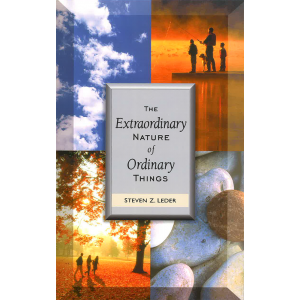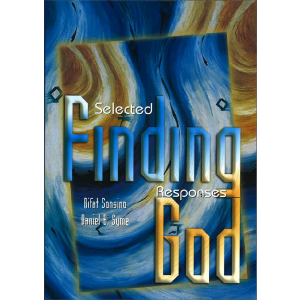Returning to Life After the Storm
Rabbi Abraham Skorka, co‐author with Pope Francis of the international bestseller, On Heaven and Earth, guides us through a careful selection of Jewish resources to help us understand what the pandemic has meant to us as human beings.
A special message from Pope Francis demonstrates the universal reach of the book’s topics and passages, and a foreword by Rabbi David Wolpe, calls out our need for an interpreter of Rabbi Skorka’s skill and experience to help all of us make meaning of what we have been through and how we can move forward.
A thoughtful guide to help anyone explore coping, healing, and beginning again in a world changed by the pandemic.
“COVID-19 put us all in crisis, and you don’t get out of a crisis alone: either we all get out together or we don’t get out.” --Pope Francis
“Rabbi Skorka wrings from our texts lessons about the pandemic, the Jewish future, and the fractured souls that we bear through this accelerated modern world.” --Rabbi David Wolpe
Table of Contents
A Special Message from Pope Francis
Foreword by Rabbi David Wolpe
Author's Note
Introduction
Part One: Entering the Maelstrom
- Clothes of Arrogance, Clothes of Light
- Extravagances and Necessities
- Pandemic of Purposelessness
- Lessons about Leadership
Part Two: Inside the Storm
- Resilience and Remembrance
- An Ethic for Everyone
- To Tend It and Keep It
- A Signal of New Possibilities
- The Days of Awe
- Reflections on an Unusual Yom Kippur
- The Blessing of Bewilderment
- COVID-19 and the Three Dialogues
- Just Another Crisis?
- Solidarity with the Weak
- The Loneliness
- In the Shadow of the Golem
- Pandemic and Polemic
Part Three: Emerging into Daylight
- Overcoming Diseases in Dialogue with God
- Light in the Darkness
- Reflections on Redemption as Christians Celebrate the Nativity
- Being at Home
- Job-Like Anguish
- The Pandemic and the War
- the Pandemic and the Peddler
Epilogue
The Blessing of Bewilderment
Excerpted from Returning to Life After the Storm: Hope and Wisdom from Jewish Sources, by Rabbi Abraham Skorka, Behrman House 2021
As you read this, (or at least as this book goes to press) the pandemic began about two years ago. Vaccines have since been created and have been found mostly effective, but too many people have also refused to take them, and too many people in the world have not had easy access to them. Conclusive solutions to the overall problem facing us are not yet full in sight.
Perhaps science today finds itself in a similar position as it was at the beginning of the twentieth century, when the so-called Spanish flu was raging. Many people, scientists included, thought that most of the secrets of nature has already been—or were about to be—discovered. They felt that only a few residual details remained to be resolved. For them, the 1918 influenza pandemic was an uncomfortable eye-opener.
This brings to mind Max Planck’s groundbreaking work in quantum mechanics. This was important because it was the beginning of a new paradigm in physics. It called into question the mathematical models of Newtonian physics. Perplexity and amazement returned to science.
Bewilderment and wonder make us aware of the limits of our knowledge but also encourage us to continue to search for fuller understandings.
We didn’t need the pandemic to teach us this. The overwhelming evidence of climate change, due to human factors, has yet to convince us that we aren’t here to dominate the planet. Nor do we control it. Now the pandemic has reinforced this teaching for us. Will we listen? Will we hear it? This is ‘teaching” or Torah, too.
These thoughts resonate with my Jewish faith. Although God is revealed to humanity in the Bible, God remains a mystery because human minds are unable to fathom God’s magnificence. This causes them to continue inquiring and seeking the presence of a higher power. Abraham surely was perplexed by the great challenges God placed before him, and in his struggle to cope with them, he found new dimensions of faith. Moses was confounded by being asked to speak on behalf of God because he was ineloquent and slow of speech. Job was bewildered by his undeserved suffering but eventually became contented. THE Bible seems to teach us that faith is born when an awareness of human limitations induces us to search for transcendent meaning.
According to the Bible, nature itself holds in its essence a message from the divine to human beings: “Lift up your eyes and see: Who has created these? (Isaiah 40:26). “The heavens proclaim the glory of God, and the firmament announces the work of His hands” (Psalms 19:2) he pandemic is only the latest enigma to challenge and reminds us that our search for meaning is always ongoing.






